Trees, textbooks and turf wars: The week at the mañaneras

Topics as trivial as the amount of air in potato chip packets and as serious as homicide rates in Mexico City were addressed by President López Obrador at his morning press conferences, or mañaneras, this week.
Among the other issues AMLO discussed were nuclear power, the disappearance of a Mexican student in Germany, the government’s controversial new school textbooks and his dislike for arduous air travel.
On Wednesday morning, the president assured reporters that his agenda-setting weekday mañaneras will continue right up until his final full day in office – Sept. 30, 2024 – and joked that he might even hold additional pressers on the weekend.
Monday
“The Maya Train is more than tracks and railcars. It’s accompanied by an extraordinary program to improve 27 archaeological zones and build 10 visitors’ centers,” Javier May, general director of the National Tourism Promotion Fund (Fonatur), said early in the first press conference of the week.
“Six Maya Train hotels are also being built very close to the archaeological zones so that visitors can have a unique experience. … The Maya Train is also accompanied by historic actions in favor of the environment,” May said, telling reporters that an area including the ancient Mayan city of Calakmul will become “the largest [natural] reserve in Mexico and the second largest in Latin America.”
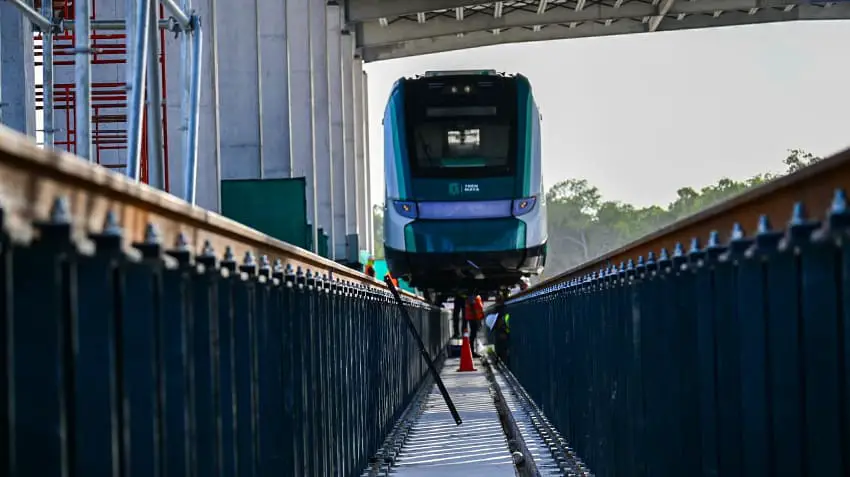
Large swathes of jungle have been cut down for the construction of the 1,554-kilometer-long railroad, but the Fonatur chief highlighted that the southeast of Mexico “is being reforested with 500 million trees.”
He also said that 400 wildlife crossings are being built along the route and noted that trains using the railroad will run on electricity and ultra-low sulfur diesel, “which will significantly reduce contaminating emissions.”
“… The Maya Train is a great project that is being built in record time, like nowhere else in the world,” declared May, who told the Milenio newspaper that the railroad is 80% complete four months ahead of its scheduled opening date.
“… We are getting closer and closer to the inauguration … in December 2023,” he said, adding that the railroad’s operation will pave the way for a “new history” to be written in Mexico’s southeast.
During his Q & A session with reporters, López Obrador was asked whether Mexico had plans to increase its capacity to generate nuclear power, as a Federal Electricity Commission (CFE) official said the state-owned firm was considering in 2019.
“We don’t have plans to create nuclear power stations, the one we have is working very well,” AMLO said, referring to the Laguna Verde plant in the Veracruz municipality of Alto Lucero de Gutiérrez Barrios.
“Electricity is generated [there] safely. To avoid speculation, I believe that it would be good to say with complete clarity that we’re not going to promote the creation of nuclear plants,” he said.
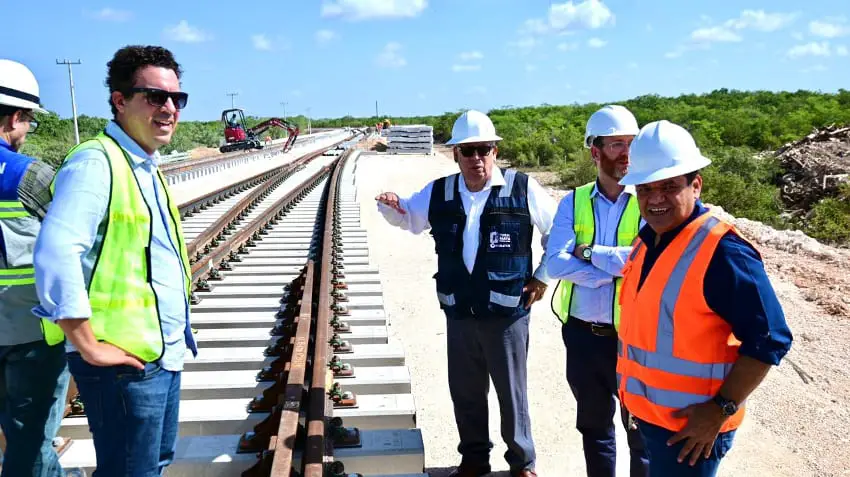
CFE director Manuel Bartlett confirmed that “there is no project to promote [additional] nuclear energy in Mexico” and noted that the firm he leads is working toward attaining a 54% share of the electricity generation market, including through the construction of new non-nuclear power plants.
He said that the president’s decision to buy 13 power plants from Spanish energy company Iberdrola provides “extraordinary support” in the quest to achieve that goal.
AMLO later reiterated that he would seek constitutional change before his six-year term ends so that “the people” rather than “the mafia of economic and political power” elect Supreme Court justices and other judges.
He declined to rule out seeking a constitutional change so that citizens are also tasked with electing the country’s attorney general.
“In one period, the period of the Restored Republic, the people elected the attorney general and the Supreme Court justices. The chief justice was the one who took charge of the presidency in the case of the absence of a sitting president,” López Obrador said.
“When the president [Benito] Juárez died, here in the National Palace, it was Sebastián Lerdo de Tejada, who was chief justice of the Supreme Court, who replaced him because [chief justices] had legality and legitimacy, they were elected by the people. That’s what we have to seek now and that’s our proposal,” he said.
Among other remarks, AMLO noted happily that the Mexican economy grew 3.6% annually in the second quarter of the year and stated that there was little clarity about the case involving the murders of a businessman and his son on the Autopista del Sol in Guerrero.
He also said that the Lake Texcoco Ecological Park project – which is under construction on a México state site where the previous federal government began building a new Mexico City airport – is progressing well.
“The land is being returned to the people of Atenco and justice is being served,” López Obrador said, referring to a municipality that borders Texcoco.
“It’s an extremely important project for the protection of the environment. It’s about recovering the lake, having the birds return. There is reforestation work in the entire area and it’s a comprehensive project that also has to do with [creating] spaces for sport,” he said.
Tuesday
Asked about a statement from the National Autonomous University (UNAM) that warned of an increase in COVID-19 cases and recommended the use of face masks in indoor spaces with little or no ventilation, López Obrador asked Deputy Health Minister Hugo López-Gatell to respond.
The government’s COVID-19 point man said it was important not to “exaggerate concern over something that the university presents very clearly and objectively.”
“What they’re saying, and we agree with their assessment, is that the situation is calm,” López-Gatell said.
He acknowledged that COVID case numbers have recently increased, but stressed that the number of hospitalized patients is very low and declared that there is no cause for alarm.
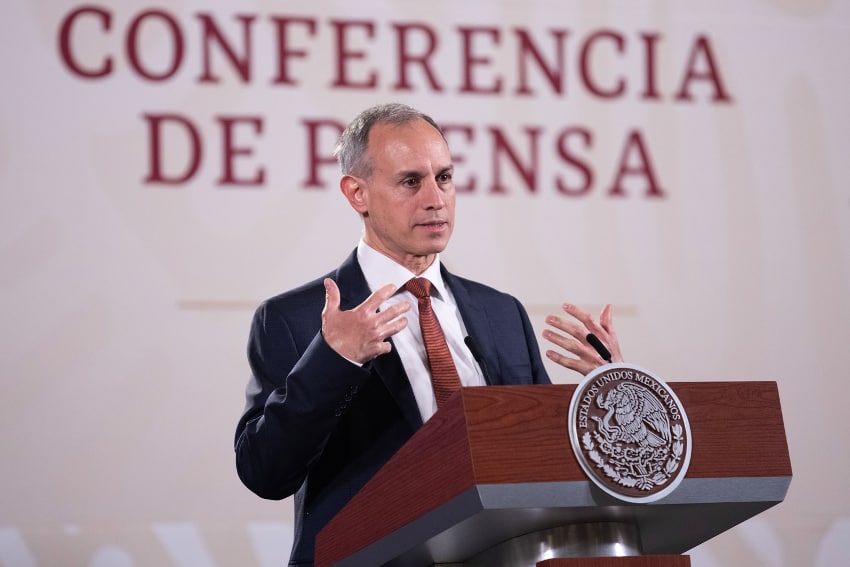
Later in the press conference, AMLO said that Foreign Affairs Minister Alicia Bárcena would travel to Chiapas later in the week to look at options for the establishment of an “international space” where a range of services will be offered to migrants from Cuba, Nicaragua, Haiti and Venezuela.
“What we’re seeking is for there to be work and training options for migrants and at the same time those who want to go to the United States can do their paperwork,” he said.
Asked whether United States authorities would be in Chiapas to process visa applications, López Obrador responded:
“No, no, no. There could be mobile consulates for those who haven’t done their paperwork and who are here in the Mexican republic. … But it’s not just the paperwork, what’s being considered is for there to be … shelters, food, medical care and also work opportunities because our country now has the possibility to offer jobs.”
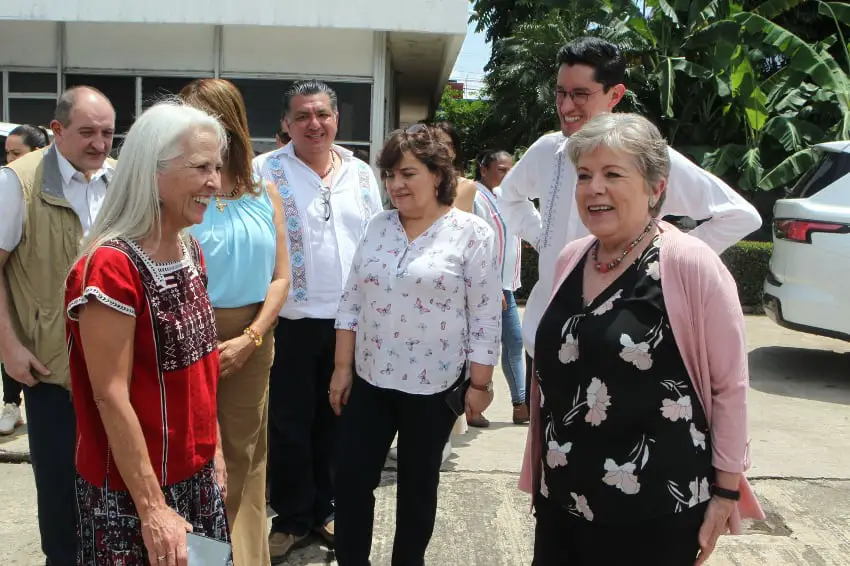
AMLO added that there is a lot of public and foreign investment in Mexico, creating demand for workers.
“Something we want to do is establish training centers to train workers, metalworkers, welders,” he said.
“… What is needed is to reach an agreement with migrants, firstly for their paperwork [to go to the United States] or at the same time tell them: look, there are employment possibilities on the Maya Train, in [the government reforestation program] Sembrando Vida, in the Isthmus of Tehuantepec projects,” López Obrador said.
One reporter asked the president about the disappearance of a 24-year-old Mexican student, María Fernanda Sánchez Castañeda, in Berlin, Germany.
“We dealt with this issue, yesterday and today, … because I offered, if necessary, to speak with the president of Germany [Frank-Walter Steinmeier],” AMLO said, adding that the Germany authorities “are helping” and progress is being made in the investigation.
Authorities are searching for Sánchez and the Mexican Embassy in Berlin is “completely dedicated” to the case, he said.
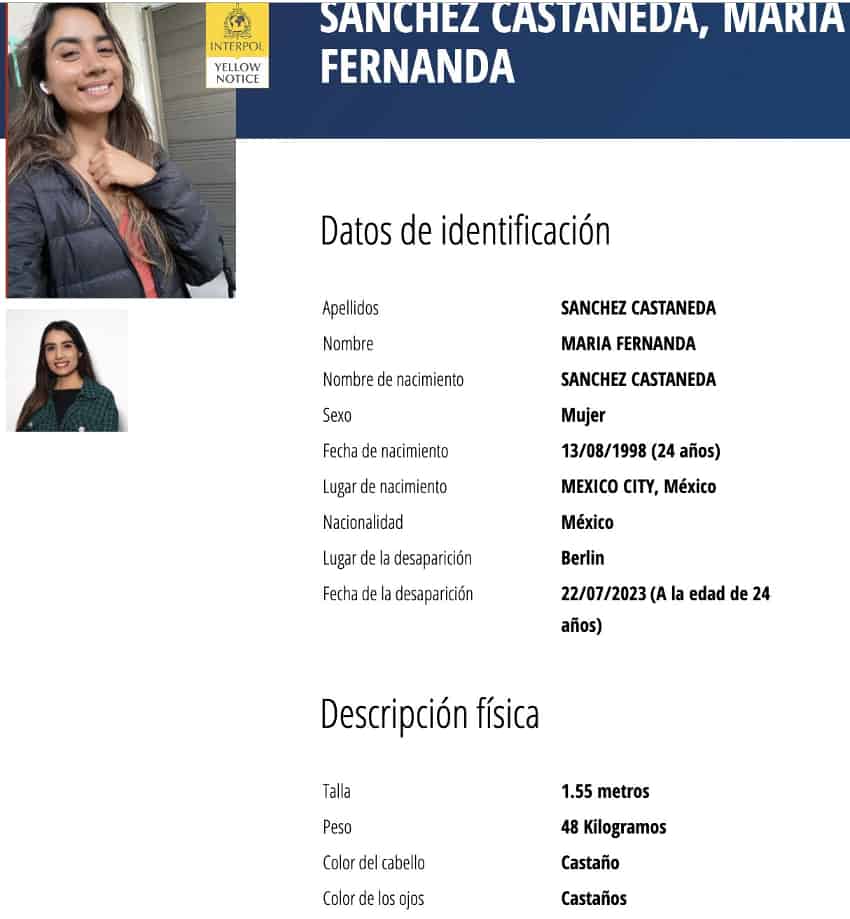
Toward the end of his mañanera, López Obrador commented on the case of an anesthesiologist in Baja California Sur who is under investigation by the Federal Attorney General’s Office for allegedly possessing illegal fentanyl.
“He has nothing to worry about. … We’re not going to proceed against a doctor who anesthetizes with fentanyl,” he said.
“… If he is innocent, he won’t lose his house, he won’t lose anything,” AMLO said in response to a reporter’s inquiry.
He subsequently said that if authorities prove that the doctor – who apparently bought the synthetic opioid on the e-commerce site Mercado Libre – was “making improper use of fentanyl or any drug, then he will have a problem with justice.”
López Obrador later acknowledged that vehicles were set on fire in Chiapas early Tuesday –an incident reportedly linked to a turf war between the Sinaloa Cartel and the Jalisco New Generation Cartel – and reported that there were seven homicides in the southern state on Monday.
However, Chiapas is “quite a calm state in terms of homicides and in general,” AMLO said.
“In towns where Indigenous culture is maintained there is less violence,” he said.
“… Where traditions, customs, language and social-community organization is maintained, there is more fraternity, solidarity, there is no theft, no aggression, no violence. That’s why maintaining our cultures is important,” López Obrador said.
Wednesday
A warehouse containing “all the medicines of the world” could be the solution to ongoing problems with the supply of pharmaceuticals, AMLO said during his Wednesday morning presser.
The president said he would put his proposal to federal health authorities and said it could provide “a definitive way out from the [medications] shortage” that has plagued his government.
“I’m going to propose the creation of a kind of pharmacy – a pharmacy in Mexico City, a warehouse, with all the medicines of the world in reasonable quantities,” López Obrador said.
He said the facility would serve as a “reserve bank of medications,” and – despite the infancy, and grandeur, of his proposal – pledged that it would be in operation before he leaves office on Oct. 1, 2024.
“The idea is to have all the medications so that we never lack any,” López Obrador said, adding that his proposal is to have a permanent inventory of all pharmaceutical drugs including those that are “the most difficult in the world to obtain.”
Later in his presser, the president spotted a rare opportunity to express an opinion about papitas – potato chips – when a reporter proposed the dissemination of televised information about harmful products at his mañaneras.
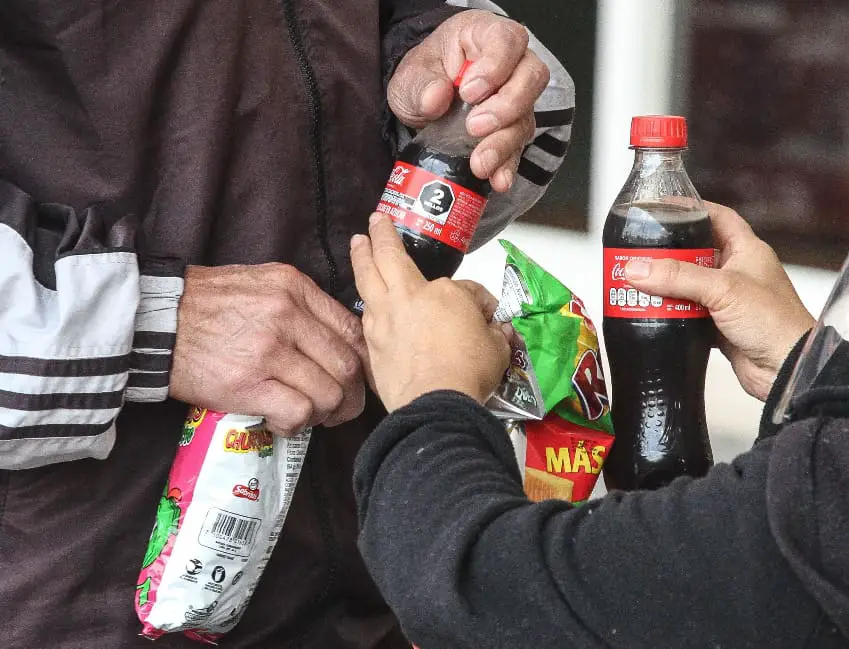
“Your proposal is very good,” AMLO said, adding that he would ask Ricardo Sheffield, head of the consumer protection agency Profeco, to consider it “because there is a lot of fraud, a lot of adulterated products [and] junk.”
“… They say, ‘las papitas.’ Well, yes [they are potato chips] … but they add a lot of salt. But … the greatest damage caused by papitas is that they cost a lot – they’re very expensive, right? They put a lot of air [in the packet]. But if you have a potato and you fry it, it’s a lot cheaper,” he said.
“We already know that there are sodas … that are harmful, but people like them. The obligation we have is to inform and then the people have to decide,” López Obrador added.
Turning to another topic, AMLO assured reporters that Mexico wasn’t about to run out of water despite recent hot weather and widespread drought.
“There is sufficient water for irrigation and domestic consumption,” he said.
“Yes, there has been heat in some areas … but there is no risk that we’ll be left without water in any part of the country,” López Obrador said before highlighting a range of water projects his government is carrying out.
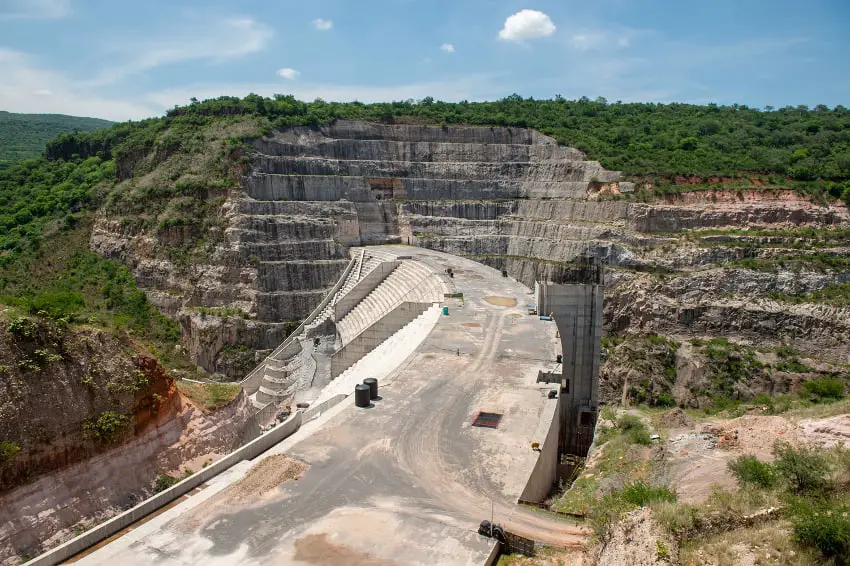
Asked whether he would appeal the ruling of the National Electoral Institute (INE) that he must abstain from speaking about electoral issues in the lead-up to elections in 2024, AMLO agreed that his rights were being violated by the gag order but ruled out challenging it in court.
The reporter subsequently told the president that two legal challenges had already been presented in his name.
“Ah, sí? The lawyers here do it as a matter of routine. You know what lawyers are like,” López Obrador said.
Before concluding his midweek press conference, AMLO reaffirmed that the government’s “adversaries – the corrupt, hypocritical conservatives – would prefer that the mañaneras didn’t exist.”
“Some of them say, ‘I don’t want the mañaneras.’ Cousin, don’t watch them, don’t watch them,” he said.
López Obrador, who presided over his first mañanera two days after he was sworn in as president, said he would hold his final press conference on Sept. 30, 2024, his final full day in the nation’s top job. He joked that he could also hold press conferences on Saturdays and Sundays if the need arose.
“See you there, adiós,” he said before leaving the Salón de la Tesorería (Treasury Hall) of the National Palace to get on with the rest of his working day.
Thursday
Asked about claims that new school textbooks to be distributed to students later this month teach the creed of the Fourth Transformation (4T) – the government’s self-anointed political agenda – AMLO said it would be “great” if they did because his administration believes in “not lying, not stealing and not betraying the people.”
However, they don’t promote the 4T’s way of thinking and claims to the contrary are a “total fabrication,” he said.
“… There is nothing to fear, nothing to worry about. The books are very well-made by specialists, educators, but above all teachers participated [in their creation],” López Obrador said.
He noted that the National Action Party’s national leader Marko Cortés has called for parents to tear out pages of the textbooks they don’t deem appropriate for their children’s education, but claimed that the prominent opposition figure hasn’t even seen them.
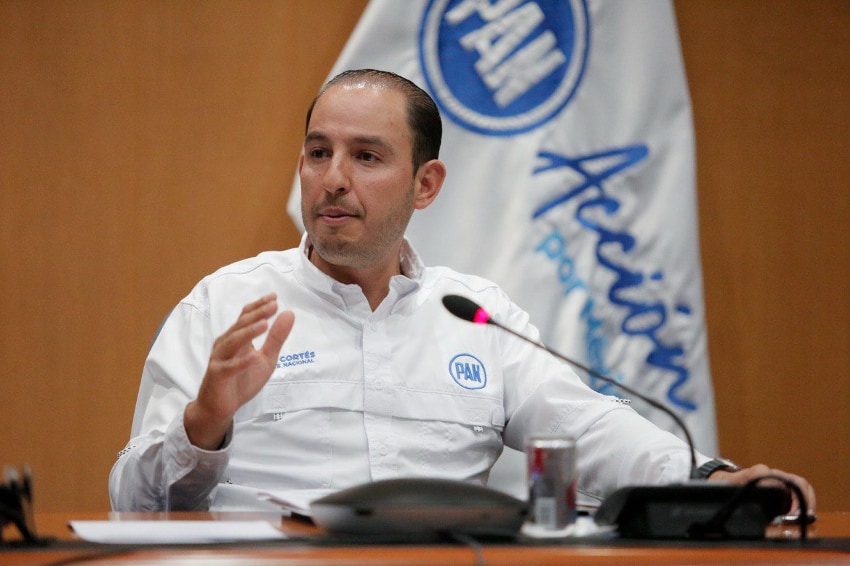
López Obrador asserted that most critics of the textbooks “haven’t even read them.” He also contended that the criticism is politically motivated.
The president later confirmed a three-week-old Reuters report that said that the federal government was no longer interested in buying the bank Citibanamex.
However, he noted that banking is a very good business as banks made record profits of 230 billion pesos in Mexico last year.
“Speaking with sincerity and responsibility, we can no longer [buy a bank] because of the [lack of] time [we have left in office]. However, a new government could and it wouldn’t be a bad business,” AMLO said.
“But here we’re back to ideology again, there are a lot of people who would say: ‘How can the government get involved in buying a bank!’ because under the neoliberal model the government shouldn’t get involved in anything that has to do with development, everything had to be left to the national or foreign private sector,” he said.
Responding to an inquiry about the Federal Electoral Tribunal’s ruling that remarks he made about Senator Xóchitl Gálvez could be considered gender-based political violence – a decision that differed from an earlier INE verdict – López Obrador called on the court to specify the “offense … I committed against the woman,” a leading aspirant to the Broad Front for Mexico‘s 2024 presidential election candidacy.
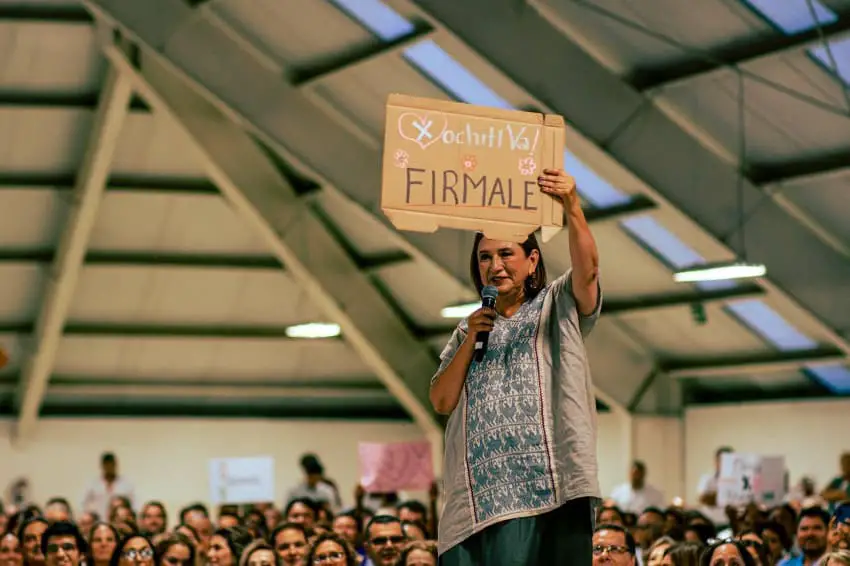
A reporter reminded the president – who claimed last month that Gálvez has already been chosen as the opposition bloc’s presidential candidate – that he called the senator the candidate of a group led by businessman Claudio X. González.
(He has also claimed that Gálvez is the “candidate of the mafia of power” and a “puppet of the oligarchy,” among other disparaging remarks.)
López Obrador doubled down on his assertion that the senator is the candidate of a faction led by González and asked: “What’s wrong with [saying] that? What violence can it be?”
Toward the end of his presser, AMLO once again confirmed that he would travel to Colombia and Chile next month, but revealed that he wasn’t looking forward to the amount of time he will have to spend in the air to get to the South American nations.
“What always concerns me are long trips, being stuck in a tube for 10 hours. … Here [in Mexico] I travel a lot, but these long trips are something else,” he said.
“And I maintain, I’ve always thought, that the best foreign policy is domestic policy. … If we do things well here, they’ll respect us abroad. If we don’t do our work here, they could look down on us abroad. The most important thing is to look after one’s home,” López Obrador said.
“It’s very important for me to go to South America because I haven’t been able to get there as president,” he said.
“And soon I’ll be in Canada, where I’ve never been, but the North American [Leaders’] Summit will be held there and they’re inviting us for the end of the year. … And I haven’t been able to go to Europe or Asia or Africa or any other continent,” AMLO said, adding that he didn’t intend to travel outside the Americas before his term as president ends.
Friday
“I believe there has been a good security policy in Mexico City for some time,” López Obrador said when asked why homicide rates had declined in the capital.
“… The city is safe,” he declared before acknowledging that “of course, there is still crime, there are still robberies, there are still unfortunate homicides.”
AMLO presented data that showed that Mexico City ranked 22nd out of the 32 federal entities for its per capita homicide rate during the 4 1/2 years since the current government took office. Another data set showed that there were 447 homicides in the Mexico City in the first six months of 2023, making the capital the 15th most violent entity this year based on total murders.
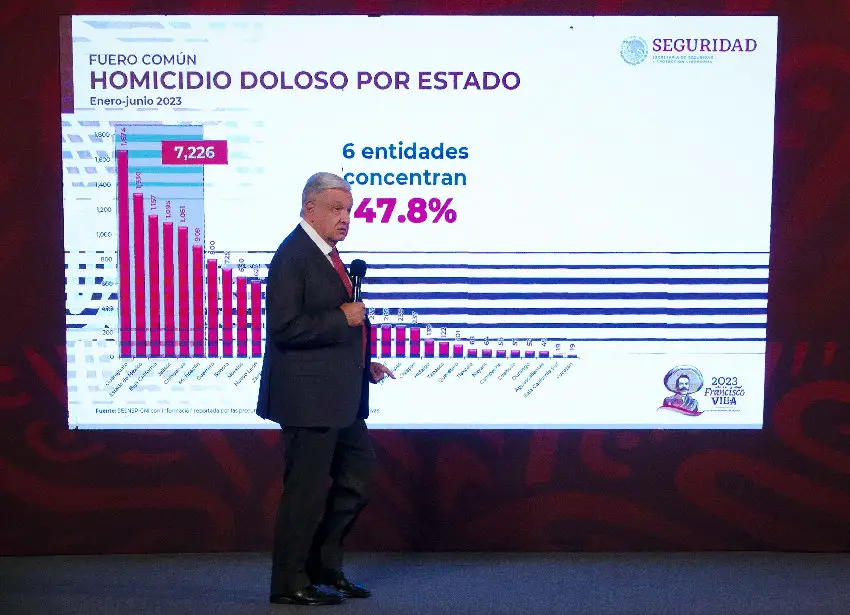
“These results are achieved here in large part due to the welfare programs, they’ve helped a lot,” López Obrador said.
“Other things as well. For example, the police in the city aren’t bad. There are four forces – the preventive police, the auxiliary police, the bank police and the ministerial police, and they’re good,” he said, adding that recent Mexico City mayors, himself included, have played an important role in making the capital safer as they have directly attended to security issues rather than delegating problems to other officials.
“It really is very satisfying to live in a safer city, it’s not perfect, but it is a city with more security,” AMLO said.
Not long before the Complaints Commission of the INE once again ordered him to abstain from speaking about Xóchitl Gálvez, López Obrador said he wouldn’t refer to the senator and presidential hopeful if he was prohibited from doing so.
However, the president – who has defied an earlier INE order to refrain from speaking about electoral issues on numerous occasions – made it clear that he believed electoral authorities were violating his right to freedom of speech.
Both the INE and the Federal Electoral Tribunal are guilty of a “flagrant violation of freedoms,” he said. “How can people be silenced?” AMLO asked.
One reporter decided to make an inquiry about the president’s feelings, asking him whether he had ever experienced moments of unhappiness.
“Like any human being, I have moments of sadness and moments of happiness, that’s the way human beings are. But there are things that make one very happy, helping others, for example,” López Obrador said.
He noted that he was “very happy” last week when data from the national statistics agency INEGI showed that poverty and inequality had decreased during his time in government.
“… I can confirm that the neediest people are being helped, that’s worth more than all the gold in the world, that’s not bought with money,” said AMLO, whose government is spending hundreds of billions of pesos per year on welfare programs.
Returning to the school textbooks controversy, López Obrador said that Education Minister Leticia Ramírez and the “specialists” who produced the books will hold a press conference next Tuesday to present information about them and respond to questions.
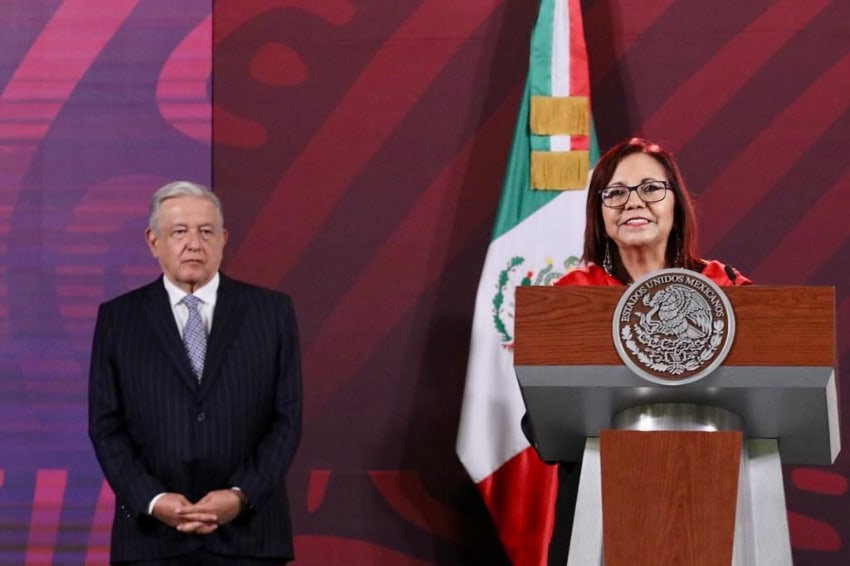
“All texts are perfectible, that’s why there are later editions with modifications, they are improved over time. The important thing is to see the essence of the books – what they contain, how they are different [from previous texts] … and what is the basis of the educators, those who made the books, which took a very long time [to produce],” he said.
AMLO also said that governors don’t have the power to stop the distribution of the textbooks, as some have threatened to do.
Late in his mañanera, López Obrador reiterated his view that the anti-migrant floating barrier set up in the Rio Grande by the government of Texas is “very inhumane.”
The Ministry of Foreign Affairs on Wednesday reported the death of a person “caught in the southern part of the buoys that were installed in the Rio Grande River” while another body was found about five kilometers upriver.
“I believe the people realize that [anti-migrant measures] are actions against fraternity, against [the principle of] love thy neighbor,” López Obrador said.
“It’s very sad because a mother identified her son [as one of the dead] and it’s a young man … from Honduras,” he lamented shortly before calling time on his final press conference of the week.
By Mexico News Daily chief staff writer Peter Davies ([email protected])
Source: Mexico News Daily

